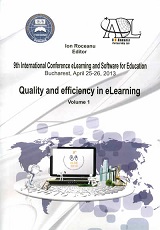E-BOOKS & E- LEARNING
E-BOOKS & E- LEARNING
Author(s): Ana Maria Călina, Ionica ȘerbanSubject(s): Education
Published by: Carol I National Defence University Publishing House
Keywords: E-book; e- learning; networks; society of information
Summary/Abstract: In the context of current development, while the trend is towards an open access to information, unrestricted by space and time, libraries must adapt to new changes existent in the society of information, in order to meet the needs of its users. Thus, with the development of computer systems, distribution of the networks especially in the universities and companies, and the advent of so many personal computers, libraries have begun to lose their customers. And this is due to the broadening of another branch of the electronic paper: the E-book. E-book or the electronic book has grown rapidly in recent years, especially in areas such as humanities i.e. dictionaries and encyclopedias. E-book is an item that does not have to be bought, or sought between dusty shelves, and is not the absent book because it was borrowed by someone else. E-book is the book from the computer, within the computer, the book available for an infinite number of readers, the book that can be read easily and that can offer a superior graphic presentation of a classic pattern. E-book is now the way to preserve the oldest books, the best method by which a rare book can be multiplied and not having to be printed. It can be read by an infinite number of people simultaneously considering that it can exist on the computer for each person. In addition, e-book is similar to writing a book, only this time the writing is reduced; it allows a permanent return to the text, the ability to correct it, making ads, and restoring it without affecting the text or its layout. Thus, compared to the usual manuscripts with additions and doodles in the margins, an e-book will look cleaner and will have an arranged text. Prices for production of an ebook are much lower than the production of a book; including the investment that one author will have to do will be much smaller. And this is due to the diminishing of the waste paper and nerves, in case of returning to the text, being only necessary the pressing a few keys.
Journal: Conference proceedings of »eLearning and Software for Education« (eLSE)
- Issue Year: 9/2013
- Issue No: 01
- Page Range: 470-475
- Page Count: 6
- Language: English

